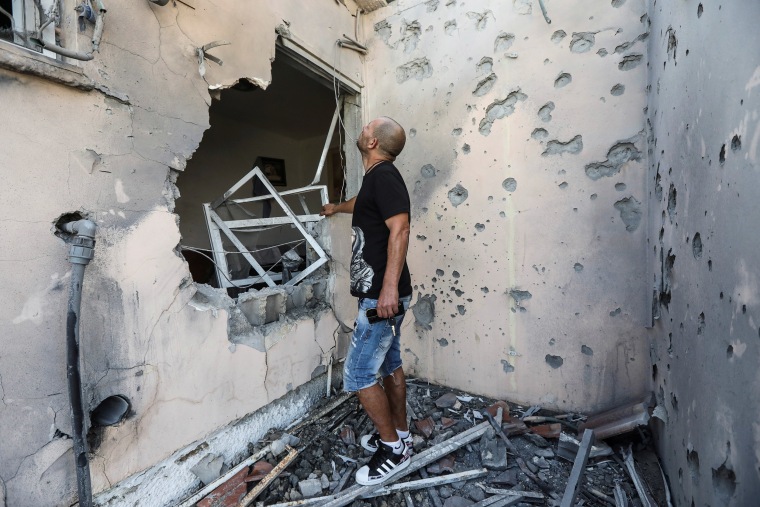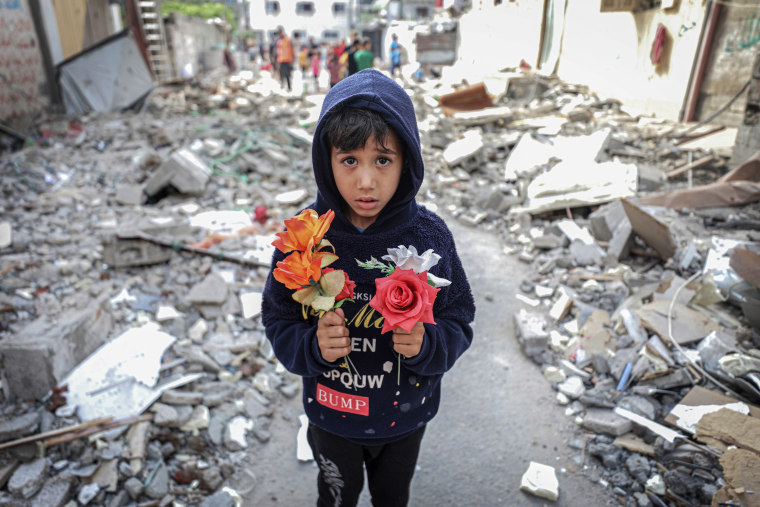JERUSALEM — U.S. Secretary of State Antony Blinken began a Middle East tour on Tuesday aimed at shoring up the cease-fire between Israel and Gaza's militant rulers, Hamas.
He will face the same obstacles that have stifled a wider peace process for more than a decade, including a hawkish Israeli leadership, Palestinian divisions and deeply rooted tensions surrounding Jerusalem and its holy sites.
"There’s a lot of hard work ahead to restore hope, respect and some trust across communities, but we’ve seen the alternative and that should cause all of us to redouble our efforts to preserve the peace and improve the lives of Israelis and Palestinians alike," Blinken said Tuesday in a press appearance with Israeli Prime Minister Benjamin Netanyahu after arriving in Israel.
He also said that the two discussed Israel’s security needs, including the U.S. replenishing the Iron Dome air defense system and a potential U.S. return to the Iran nuclear agreement, which former President Donald Trump exited.
"We will continue to strengthen all aspects of our longstanding partnership, and that includes consulting closely with Israel as we did today on the ongoing negotiations in Vienna," Blinken said, referring to negotiations with Tehran.

Later on Tuesday, Blinken met with Palestinian President Mahmoud Abbas in Ramallah, in the occupied West Bank.
During the meeting, Blinken announced the reopening of the U.S. Consulate General in Jerusalem — a move that restores ties with the Palestinians.
The consulate long served as an autonomous office in charge of diplomatic relations with the Palestinians. But former President Donald Trump downgraded its operations and placed them under the authority of his ambassador to Israel when he moved the embassy to Jerusalem.
The move infuriated the Palestinians, who view east Jerusalem as occupied territory and the capital of their future state.
The U.S. is trying to bolster Abbas in his rivalry with Gaza’s ruling Hamas militant group and on the international stage.
However, Abbas has no power in Gaza and was sidelined by recent events.
He called off the first Palestinian elections in 15 years last month when it appeared his fractured Fatah movement would suffer an embarrassing defeat, and is seen by many Palestinians as having lost all legitimacy.
But Abbas is still seen internationally as the representative of the Palestinian people and a key partner in the long-defunct peace process.
Blinken will not be meeting with the other party to the war, the Islamic militant group Hamas, which does not recognize Israel’s right to exist.
He also announced that the Biden administration will notify Congress of its intention to provide $75 million in additional development and economic assistance to the Palestinians this year. Separately, the U.S. will provide $5.5 million in immediate disaster relief for Gaza, Blinken said.
Download the NBC News app for breaking news and politics
The 11-day Gaza war killed more than 250 people, mostly Palestinians, and caused widespread destruction in the impoverished coastal territory. Blinken is expected to focus on coordinating reconstruction without engaging with Gaza's militant Hamas rulers, who are considered terrorists by Israel and Western countries, including the U.S.
The truce that came into effect Friday has so far held, but it did not address any of the underlying issues.
Blinken is the highest-ranking U.S. official to visit the region since President Joe Biden assumed office. He was welcomed on the tarmac by Israeli Foreign Minister Gabi Ashkenazi and other officials.
The administration had hoped to extricate the U.S. from the region’s intractable conflicts and focus on competition with China and climate change. But like so many of its predecessors, it was pulled back into the Middle East by another outbreak of violence.
Netanyahu is fighting for his political life after a fourth inconclusive election in two years and faces mounting criticism from Israelis who say he ended the offensive prematurely, without forcibly halting Palestinian rocket attacks or dealing a heavier blow to Gaza’s militant Hamas rulers.
The war was triggered by weeks of clashes in Jerusalem between Israeli police and Palestinian protesters in and around the Al-Aqsa Mosque compound, a flashpoint holy site. The protests were directed at Israel’s policing of the area during the Muslim holy month of Ramadan and the threatened eviction of dozens of Palestinian families by Jewish settlers.
The evictions were put on hold just before the Gaza fighting erupted, but the legal process is set to resume in the coming weeks. Police briefly clashed with protesters at Al-Aqsa on Friday, hours after the cease-fire came into effect. The site is revered by Jews and Muslims, and has seen several outbreaks of Israeli-Palestinian violence over the years.
Netanyahu is unlikely to make any public concessions on Al-Aqsa or the evictions because it would be seen as giving in to Hamas' demands.
Adding to the tensions, an Israeli soldier and a civilian were stabbed and wounded in east Jerusalem on Monday before police shot and killed the assailant in what they described as a terrorist attack.
A Palestinian man was shot and killed by undercover Israeli forces early Tuesday near Ramallah, where the Palestinian Authority is headquartered, according to the PA's official Wafa news agency. Pictures circulating online appeared to show the man, identified as Ahmed Jamil Fahed, bloodied and lying in the street. The Israeli army referred questions to the Border Police, which did not respond to requests for comment.

Blinken will also visit neighboring Egypt and Jordan, which made peace with Israel decades ago and have acted as mediators in the conflict. Egypt succeeded in brokering the Gaza truce after the Biden administration pressed Israel to wind down its offensive.
Biden announced the visit, saying Blinken would work with regional partners on a “coordinated international effort to ensure immediate assistance reaches Gaza.”
The administration had been roundly criticized for its perceived hands-off initial response to the deadly violence, including from Democratic allies in Congress who demanded it take a tougher line on Israel. Biden repeatedly affirmed what he said was Israel’s right to defend itself from rocket attacks from Gaza.
The administration has defended its response by saying it engaged in intense, but quiet, high-level diplomacy to support a cease-fire.
In an interview with CNN over the weekend, Blinken said the administration is now focused on trying to “build something more positive,” saying Palestinians and Israelis deserve “equal measures of opportunity, of security, of dignity.”
He said the time is not right for an immediate resumption in negotiations, but that steps could be taken to repair the damage from Israeli airstrikes, which destroyed hundreds of homes and damaged infrastructure in Gaza.
The narrow coastal territory, home to more than 2 million Palestinians, has been under a crippling Israeli-Egyptian blockade since Hamas seized power from Abbas’ forces in 2007. Israel says the blockade is needed to keep Hamas from importing arms, while the Palestinians and human rights groups view it as a form of collective punishment.
